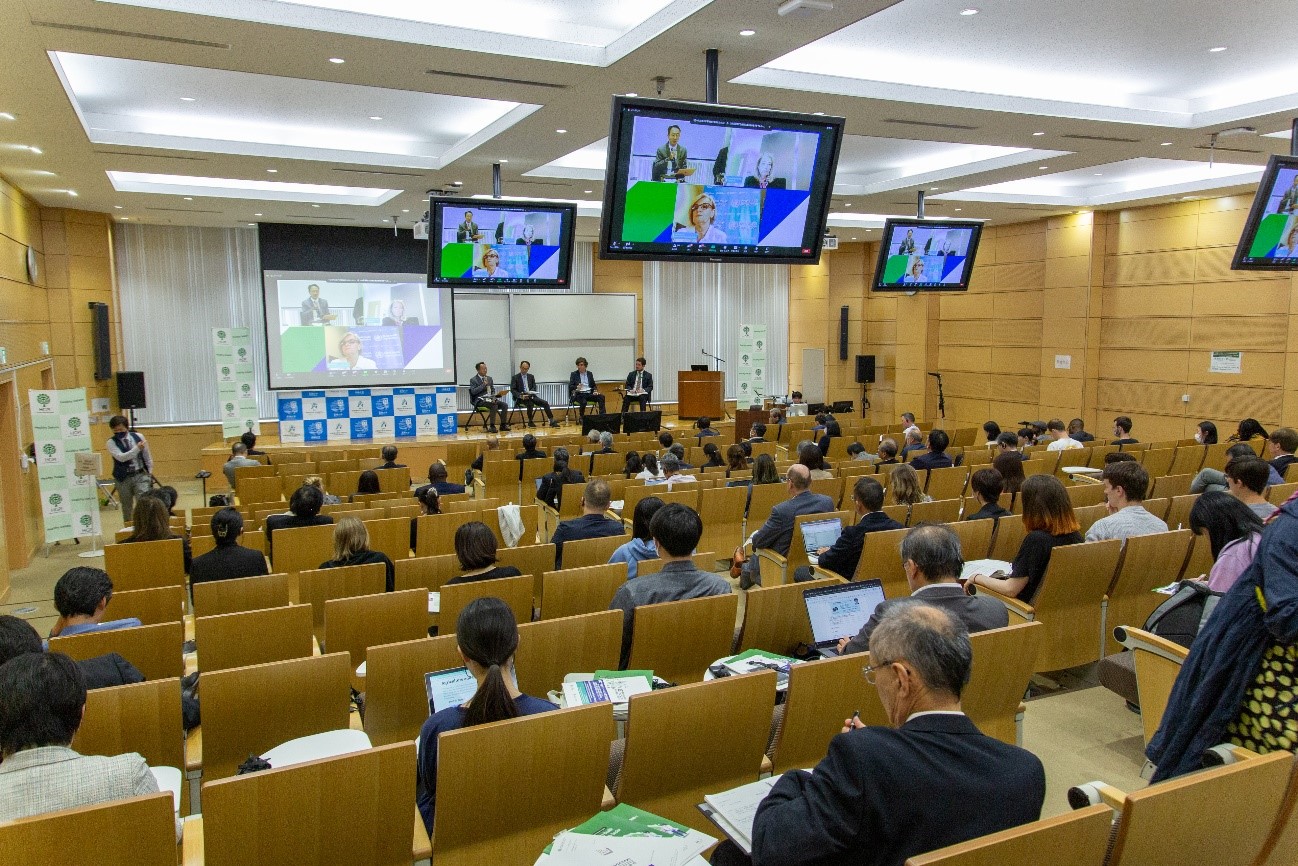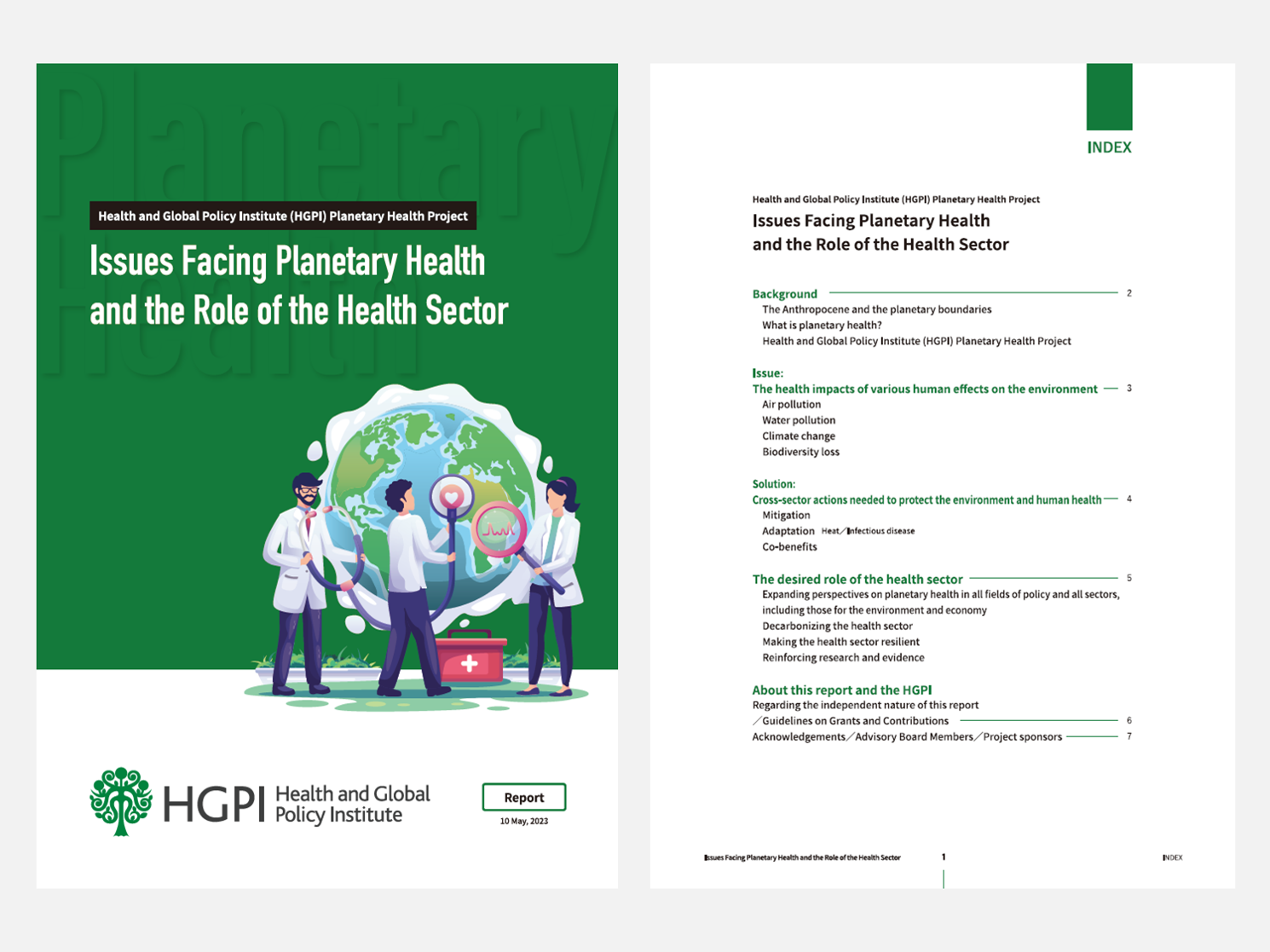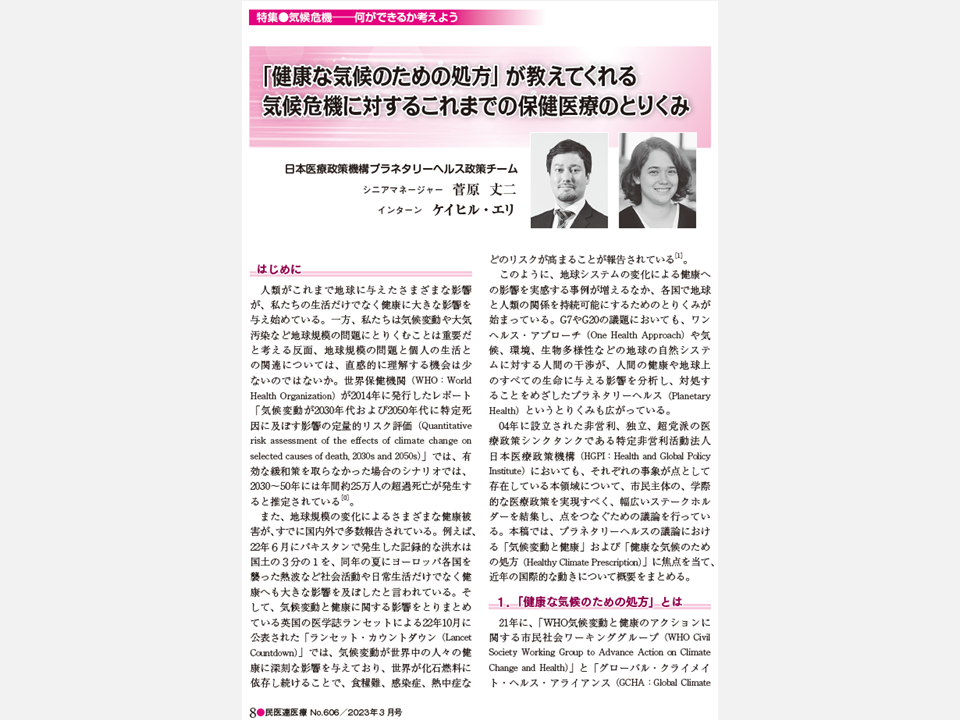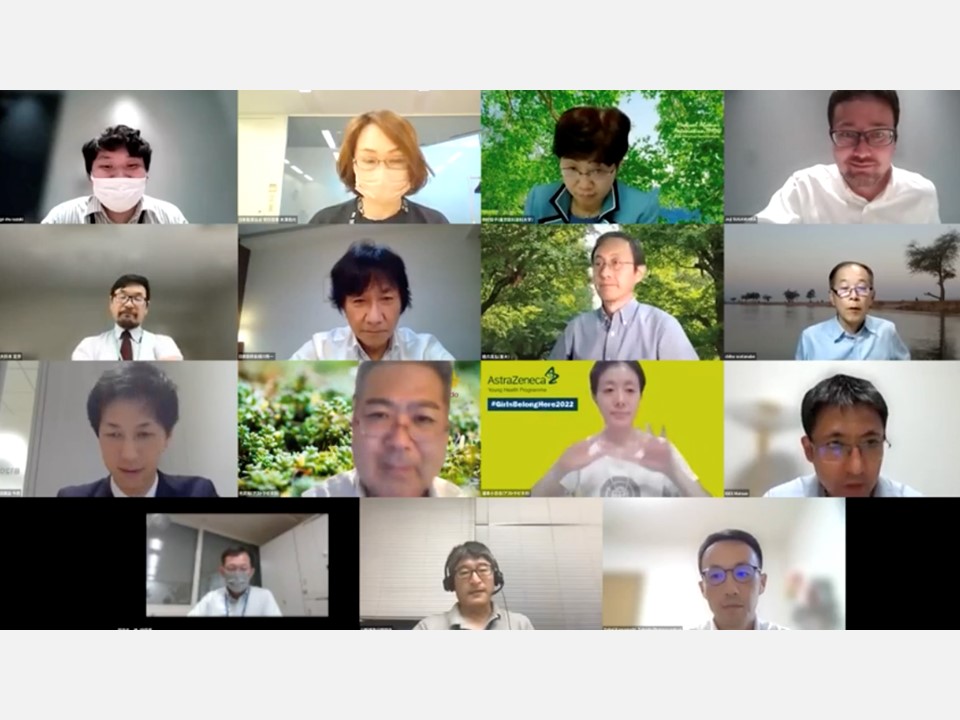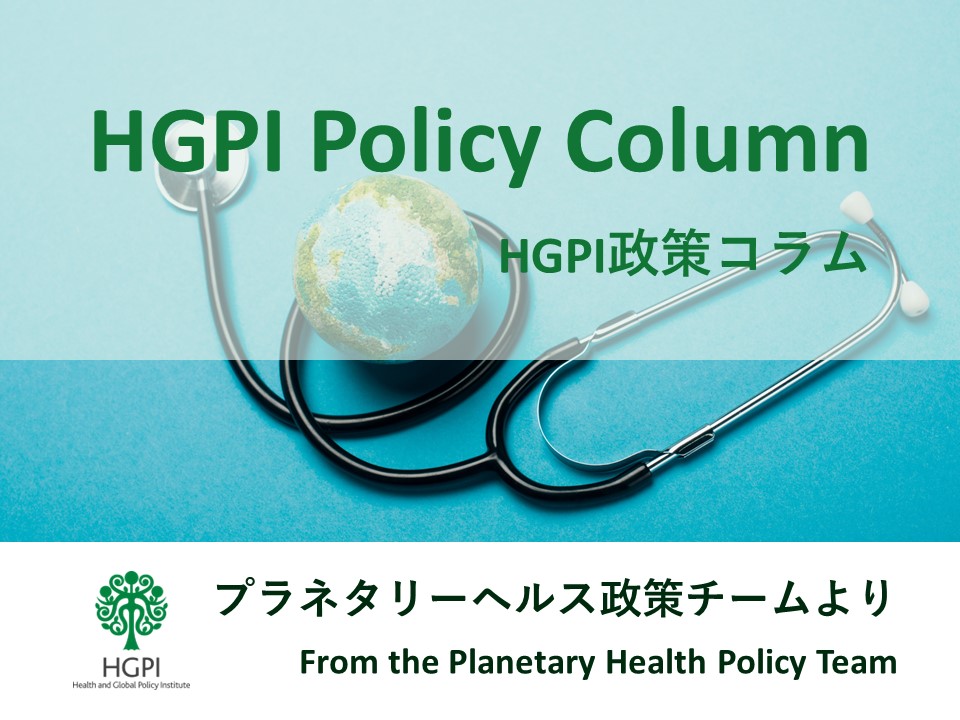[Event Report] The 117th HGPI Seminar “The Impact of Biodiversity Loss on Health and Future Prospects” (June 28, 2023)
date : 7/31/2023
Tags: HGPI Seminar, Planetary Health
![[Event Report] The 117th HGPI Seminar “The Impact of Biodiversity Loss on Health and Future Prospects” (June 28, 2023)](https://hgpi.org/en/wp-content/uploads/sites/2/hs-117-top_JPNENG-03-1.png)
For the 117th HGPI Seminar, we hosted Dr. Hiroya Yamano, Director of the Biodiversity Division of the National Institute for Environmental Studies, Japan (NIES). After an introduction of HGPI activities, Dr. Yamano gave a comprehensive talk on biodiversity and human health.
Key points of the lecture
- The situation surrounding biodiversity loss has become severe and requires a nature-positive approach
- While biodiversity and health have attracted attention in Japan and around the world, the link between biodiversity and human health must be incorporated into biodiversity conservation and sustainable use in a more explicit manner
- Environmental problems are related to multiple issues and are not independent, meaning we must design measures that take the synergies and conflicts among environmental problems into account
Biodiversity loss has exceeded the planet’s limits
The biosphere plays a key role as the foundation supporting society and the economy. However, examining the Planetary Boundaries, which denote the Earth’s limits in various areas, we see that there has been significant loss of biodiversity. This has resulted in a crisis. Signs that extinction risk is growing for organisms in various taxonomic groups in recent years have even led some to question if we are experiencing the sixth period of mass extinction.
It is clear that human activities are a major driver of biodiversity loss. The Intergovernmental Science-Policy Platform on Biodiversity and Ecosystem Services (IPBES) Global Assessment Report says it is clear that significant biodiversity loss is occurring due to human-caused factors such as land-use change, water extraction, climate change, and pollution. In Japan, abandoned farmland and other forms of land management neglect are contributing to declines in wildlife, such as those found in the areas between mountain foothills and arable flat lands (areas referred to as “Satoyama”).
As various factors continue to affect and degrade the biosphere, ecosystem services – the benefits to humans provided by the natural environment – also decline, as does our quality of life. Stopping this cycle of loss will require us to transform our societies to address the aforementioned direct factors as well as the indirect factors (or, human socioeconomic factors) in the background.
The links between biodiversity and human health
Negative aspects: Zoonoses
The problem of infectious diseases is closely related to biodiversity. Japan’s overuse of natural resources in other countries and neglect of natural environment management has resulted in negative impacts in the form of zoonoses. The over-exploitation of other countries’ natural resources is causing humans and wildlife to come into contact more frequently. When infectious disease outbreaks occur, the international movement of people and transport of goods can carry pathogens into Japan. At the same time, Japan has neglected to manage the natural environment within its borders, and this is causing infectious diseases to spread among livestock and wildlife.
Positive aspects: Human health benefits, etc.
We know of several ways humans benefit from biodiversity. Signs that biodiversity provides better physical and mental health or social connections and is linked to human health and well-being are beginning to appear. A new way of viewing biodiversity as a form of capital and infrastructure is also emerging. Furthermore, discussions are being held on a concept called the biodiversity hypothesis, which suggests that a reduction in biodiversity may be associated with more disease in humans.
Setting national and global targets for biodiversity
The Kunming-Montreal Global Biodiversity Framework
A number of frameworks including the Kunming-Montreal Global Biodiversity Framework (GBF) were adopted at the Fifteenth meeting of the Conference of the Parties (COP-15) to the Convention on Biological Diversity (CBD). The set of items was proposed and agreed upon included the GBF, indicators and progress management methods for the targets it set, and methods for implementing it. However, an agreement has not been reached regarding actual indicators and progress management, which will be discussed at the 2024 United Nations Biodiversity Conference (COP16) of the Parties to the UN CBD, which is to be held in Turkey in late October 2024.
The Kunming-Montreal GBF has also elevated ambitions overall, leading to the establishment of several numerical targets. These include an initiative called “30 by 30,” in which governments aim to designate 30% of Earth’s land and ocean area as protected areas by 2030. While the phrase “nature positive” itself was not adopted in the Kunming-Montreal GBF, it incorporated nature-positive concepts like halting biodiversity loss and improving biodiversity.
The Kunming-Montreal GBF also included health-related targets. Target 5 mentions pathogen spill-over in the trade in wild species, placing the One Health Approach at the forefront, while Target 12 discusses the roles of urban green spaces related to human health and well-being. While it is good for each of these targets to be included, the passage mentioning the One Health Approach does not convey an understanding of its total impact on biodiversity. Furthermore, its treatment of health and well-being is limited to urban spaces, which leaves the impression that this item was somewhat trivialized.
In response to the Kunming-Montreal GBF, Japan finalized its National Biodiversity Strategy 2023-2030 on March 31, 2023. That strategy included indicators and was created relatively early in response to the Kunming-Montreal GBF. It mentions Health and One Health and positions a nature-positive approach at the forefront.
The G7 Health Ministers’ Meeting in Nagasaki
The outcome documents of the G7 Nagasaki Health Ministers’ Meeting held in Nagasaki on May 13 and 14, 2023, place great emphasis on the relationship between One Health and health through statements on mitigating the risk of health crises due to biodiversity loss and zoonotic spillover and spillback. As such, we can conclude that those documents possess sufficient recognition toward the need to take action for targets related to the Kunming-Montreal GBF. In the future, we must advance these discussions in a manner that connects biodiversity issues and health issues in greater depth.
Necessary perspectives for the future
We are seeing rapid popularization of the concept of a society that co-exists with nature in a harmonious relationship and the concept of One Health, in which the health of humans, animals, and the environment are viewed as one to ensure good health for all. As discussions progress, it will be important to center them on the perspective of human health instead of only focusing on the concepts of biodiversity conservation and sustainable use. In addition, I think incorporating the perspective of human health will foster an active awareness of our relationship with biodiversity, and that will lead to further discussions and consensus-building on conservation or sustainable use.
Biodiversity is not an issue that exists on its own. Rather, it has strong ties to climate change and many other environmental issues. We must establish measures that aim to achieve simultaneous solutions while taking the linkages and interactions among environmental issues into account. To do so, I have high expectations for people in the health sector to encourage understanding of this field and to get actively involved in it.
[Event Overview]
- Speaker: Hiroya Yamano (Director, Biodiversity Division, National Institute for Environmental Studies)
- Date & Time: Wednesday, June 28, 2023; from 18:30 to 19:45 JST
- Format: Online (Zoom webinar)
- Language: Japanese
- Participation fee: Free
- Capacity: 500
■ Speaker Profile:
 Hiroya Yamano (Director, Biodiversity Division, National Institute for Environmental Studies)
Hiroya Yamano (Director, Biodiversity Division, National Institute for Environmental Studies)
Dr. Hiroya Yamano graduated from the Department of Geography of the University of Tokyo Faculty of Science before joining the National Institute for Environmental Studies (NIES) in 1999, where he researches ecosystem response to environmental change and ecosystem conservation. His research focuses on coral reefs along the coasts of Japan and other island countries. Currently, Dr. Yamano serves as Director of the Harmonization with Nature Research Program at the National Institute for Environmental Studies, where he is engaged in research and technological development for biodiversity conservation and the sustainable use of ecosystem services.
Top Research & Recommendations Posts
- [Policy Recommendations] The Path to a Sustainable Healthcare System: Three Key Objectives for Public Deliberation (January 22, 2026)
- [Research Report] Perceptions, Knowledge, Actions and Perspectives of Healthcare Organizations in Japan in Relation to Climate Change and Health: A Cross-Sectional Study (November 13, 2025)
- [Research Report] The 2025 Public Opinion Survey on Healthcare in Japan (March 17, 2025)
- [Policy Recommendations] Reshaping Japan’s Immunization Policy for Life Course Coverage and Vaccine Equity: Challenges and Prospects for an Era of Prevention and Health Promotion (April 25, 2025)
- [Research Report] The 2023 Public Opinion Survey on Satisfaction in Healthcare in Japan and Healthcare Applications of Generative AI (January 11, 2024)
- [Research Report] AMR Policy Update #4: Cancer Care and AMR (Part 1)
- [Policy Recommendations] Developing a National Health and Climate Strategy for Japan (June 26, 2024)
- [Public Comment Submission] “Assessment Report on Climate Change Impacts in Japan (Draft Overview)” (December 24, 2025)
- [Research Report] Survey of Japanese Physicians Regarding Climate Change and Health (December 3, 2023)
- [Research Report] The Public Opinion Survey on Child-Rearing in Modern Japan (Final Report) (March 4, 2022)
Featured Posts
-
2026-01-09
[Registration Open] (Hybrid Format) Dementia Project FY2025 Initiative Concluding Symposium “The Future of Dementia Policy Surrounding Families and Others Who Care for People with Dementia” (March 9, 2026)
![[Registration Open] (Hybrid Format) Dementia Project FY2025 Initiative Concluding Symposium “The Future of Dementia Policy Surrounding Families and Others Who Care for People with Dementia” (March 9, 2026)](https://hgpi.org/en/wp-content/uploads/sites/2/dementia-20260309-top.png)
-
2026-02-05
[Registration Open] (Webinar) The 141st HGPI Seminar “Current Status and Future Prospects of Korea’s Obesity Policy: Voices of People with Lived Experience in Policy Promotion” (March 3, 2026)
![[Registration Open] (Webinar) The 141st HGPI Seminar “Current Status and Future Prospects of Korea’s Obesity Policy: Voices of People with Lived Experience in Policy Promotion” (March 3, 2026)](https://hgpi.org/en/wp-content/uploads/sites/2/hs141-top-1.png)
-
2026-02-06
[Research Report] AMR Policy Update #5: Cancer Care and AMR (Part 2)
![[Research Report] AMR Policy Update #5: Cancer Care and AMR (Part 2)](https://hgpi.org/en/wp-content/uploads/sites/2/HGPI_20260204_AMR-Policy-Update-5.png)






